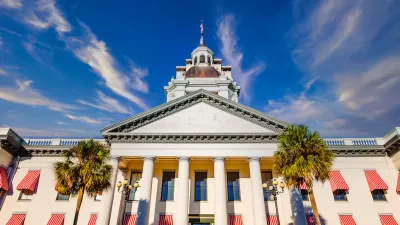Minnesota utility company Xcel Energy plans to close four coal plants by 2030 and fully switch to renewable energy sources by 2050.

One of Minnesota's largest utility companies, Xcel Energy plans to shutter four remaining coal-burning plants by 2030, reports Gregg Aamot. A handful of other plants across the state have similar plans to shut down coal-burning operations before Xcel Energy's self-imposed deadline. Shutting down the plants will go a long way in reducing carbon emissions in Minnesota: "Three-fourths of the greenhouse gases emitted by electric companies in Minnesota comes from Xcel Energy and Minnesota Power plants, according to MPCA statistics. The percentage is even higher for coal-produced emissions," writes Aamot.
But while Xcel Energy's Sherco plant contributes to greenhouse gas emissions, it also accounts for 75% of the city of Becker's tax base, a growing community with 5,000 residents. According to Audrey Partridge of Center for Energy and Environment, a trend will emerge in towns where coal-burning energy plants once heavily contributed to local taxes: residents will have to pick up the slack. Since 2005, Minnesota utilities have reduced their reliance on coal from 95% to only 50% by way of investing in renewable resources. "Xcel Energy, meanwhile, hopes to generate 80 percent of its power from renewable energy sources, such as wind and solar, by 2030 and to generate all of its energy from renewable sources by mid-century," reports Aamot.
FULL STORY: Phasing out: Utilities, cities prepare for the end of coal-fired energy in Minnesota

Alabama: Trump Terminates Settlements for Black Communities Harmed By Raw Sewage
Trump deemed the landmark civil rights agreement “illegal DEI and environmental justice policy.”

Planetizen Federal Action Tracker
A weekly monitor of how Trump’s orders and actions are impacting planners and planning in America.

The 120 Year Old Tiny Home Villages That Sheltered San Francisco’s Earthquake Refugees
More than a century ago, San Francisco mobilized to house thousands of residents displaced by the 1906 earthquake. Could their strategy offer a model for the present?

Opinion: California’s SB 79 Would Improve Housing Affordability and Transit Access
A proposed bill would legalize transit-oriented development statewide.

Record Temperatures Prompt Push for Environmental Justice Bills
Nevada legislators are proposing laws that would mandate heat mitigation measures to protect residents from the impacts of extreme heat.

Downtown Pittsburgh Set to Gain 1,300 New Housing Units
Pittsburgh’s office buildings, many of which date back to the early 20th century, are prime candidates for conversion to housing.
Urban Design for Planners 1: Software Tools
This six-course series explores essential urban design concepts using open source software and equips planners with the tools they need to participate fully in the urban design process.
Planning for Universal Design
Learn the tools for implementing Universal Design in planning regulations.
Clanton & Associates, Inc.
Jessamine County Fiscal Court
Institute for Housing and Urban Development Studies (IHS)
City of Grandview
Harvard GSD Executive Education
Toledo-Lucas County Plan Commissions
Salt Lake City
NYU Wagner Graduate School of Public Service





























